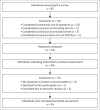Point-of-care ultrasound competency of doctors working in Cape Town emergency departments
- PMID: 40776732
- PMCID: PMC12339809
- DOI: 10.4102/safp.v67i1.6151
Point-of-care ultrasound competency of doctors working in Cape Town emergency departments
Abstract
Background: Point-of-care ultrasound (PoCUS) is a core competency in emergency medicine, and its use in other primary healthcare settings is growing. The study investigates the PoCUS competency, training and qualifications of doctors working in public emergency departments.
Methods: An online survey was distributed to doctors at five public Cape Town emergency departments, followed by a practical assessment of an Extended Focused Assessment with Sonography in Trauma (eFAST) and a basic cardiac ultrasound examination. Descriptive and inferential statistics are presented.
Results: All participants had attended an in-person PoCUS course before, and 45 (83.3%) were trained by supervisors at work. Eleven participants (20.4%) were credentialled. In the practical assessment, 73.5% were rated as competent in eFAST and 55.9% in basic cardiac ultrasound. The median scores were 80.4% (eFAST) and 76.9% (cardiac ultrasound). Credentialled participants were more likely to achieve a pass mark ( 60%) in eFAST (p 0.001) and cardiac ultrasound (p 0.001).
Conclusion: All the emergency department doctors who use PoCUS had received formal PoCUS training, and the majority of PoCUS providers had an adequate skill level in the applications tested. The credentialled providers performed better overall. There is a need for further research to investigate the persistently low credentialling rate and potential solutions, not only among practitioners in emergency departments but also generalists and primary care practitioners.Contribution: Our study provides a unique snapshot of the PoCUS skills of junior doctors and trainees in public Cape Town emergency departments.
Keywords: South Africa; competence; credentialling; emergency medicine; training; ultrasound.
Conflict of interest statement
The authors declare that they have no financial or personal relationships that may have inappropriately influenced them in writing this article.
Figures
Similar articles
-
Effectiveness of a simulation-based point-of-care ultrasound course for prehospital providers - a single group quasi-experimental study.BMC Med Educ. 2025 Jul 21;25(1):1093. doi: 10.1186/s12909-025-07675-w. BMC Med Educ. 2025. PMID: 40691557 Free PMC article.
-
The ultrasound competency assessment tool for evaluation of early pregnancy with POCUS.CJEM. 2025 Feb;27(2):111-116. doi: 10.1007/s43678-024-00839-5. Epub 2025 Jan 3. CJEM. 2025. PMID: 39752091
-
Rural Canadian emergency physician experiences using point-of-care ultrasound.CJEM. 2025 Mar;27(3):191-197. doi: 10.1007/s43678-024-00829-7. Epub 2025 Jan 8. CJEM. 2025. PMID: 39776068
-
Diagnostic Accuracy of History, Physical Examination, Laboratory Tests, and Point-of-care Ultrasound for Pediatric Acute Appendicitis in the Emergency Department: A Systematic Review and Meta-analysis.Acad Emerg Med. 2017 May;24(5):523-551. doi: 10.1111/acem.13181. Acad Emerg Med. 2017. PMID: 28214369
-
Signs and symptoms to determine if a patient presenting in primary care or hospital outpatient settings has COVID-19.Cochrane Database Syst Rev. 2022 May 20;5(5):CD013665. doi: 10.1002/14651858.CD013665.pub3. Cochrane Database Syst Rev. 2022. PMID: 35593186 Free PMC article.
References
-
- The African Federation for Emergency care curriculum [homepage on the Internet]; 2017. [cited 2024 June 04]. Available from: https://afem.co.za/wp-content/uploads/2017/10/AFEM-Curriculum.pdf
MeSH terms
LinkOut - more resources
Full Text Sources


